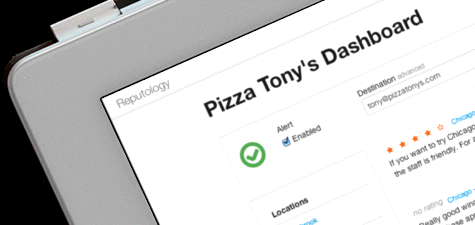
Look up a restaurant these days, and you’ll probably find plenty on line. The restaurant’s website, reviews in newspapers and food sites, and reviews by anonymous people who have eaten there. Even a great restaurant can be targeted by negative reviews. So what, Super Chef wonders, is a restaurateur suppose to do?
A group of MIT graduates have launched an online tool to help local businesses –including restaurants – monitor and manage their online reviews. They just launched a free version at Reputology.com, and they are trying to get the word out. Super Chef caught up with one of the creators, Jack Yu, to find out more about Reputology.com.

Super Chef: Why did you create Reputology?
Jack Yu: Reputology wasn’t obvious to us when we began. The first few businesses we spoke to wanted us to get them more positive reviews and take down the negative ones. But of course, that sort of behavior can get you flagged. What we later discovered while speaking to restaurateurs who were savvy on social media was that staying on top of your reviews and responding promptly and professionally was an effective tactic. In fact, one person said they could get an unhappy reviewer to change their mind something like 7 out of 10 times. We saw potential there, and that’s why we built Reputology.I’ll be honest and say my business partner, Nori Yoshida and I have a different recollection on how we got started. What I remember is that we had hit a wall trying to come up with a business idea, so while we were surfing the web (aka procrastinating), we came across this internet meme called dramatic Yelp readings and discovered a sub-culture on the internet poking fun at unreasonable reviews. At first it was just funny, entertaining stuff to kill time, but we realized it was rooted in real frustration and maybe we could help.
Super Chef: Who’s behind Reputology?
Jack Yu: We’re buddies from our undergraduate days at MIT. I guess like a lot of college friends, we always wanted to do a business together and love making fun of each other. So creating Reputology was the best way to do both.Super Chef: How is this different from other products out there?
Jack Yu: What we’ve aimed for is a lean tool that’s very good at what it does. As of today, Reputology sends you alerts for new reviews and aggregates all your reviews into one place. As a result, it’s flexible to how you and your organization want to do things.That’s not to say we aren’t constantly thinking of new features or services that could add value, but in general, we shy away from extra stuff that makes the product sound sexy but ends up making it harder to use or not substantive. Sales driven business cultures could probably pull that off, but we are engineers and product guys at heart.
Oh, and we’ve got a free version of our product!
[Editor’s Note: Click here to try Reputology.]
Super Chef: Does this get rid of negative reviews?
Jack Yu: No, not directly. Reputology sends you email alerts for new reviews and aggregates all of the reviews, across all of your business locations, into one place. The goals are to:Make sure you’re aware of what’s happening on review sites so that you don’t need to worry about missing anything Give you the opportunity to take near-term action if you decide a response is appropriate Help you process the reviews as customer feedback for longer-term corrective action. In other words, the Reputology dashboard makes it easier to see what you’ve been doing right and what you can improve. At this point, we have heard from multiple users who said they could get a reviewer to change the review or return to the store 7-8 out of 10 times if they respond quickly. It’s anecdotal evidence but a positive sign.
Super Chef: How important should this be to restaurateurs?
Jack Yu: Many studies have come out that show online reviews matter. Businessweek did a study that shows 70% of consumers consult a review before making a purchase. And a Harvard Business School study concluded that 1 star was equivalent to 5-9% in sales.As frustrated as businesses may feel towards reviews, they can take action. And one of the more manageable (and aboveboard) things they can do is monitor their reviews and respond promptly and professionally when appropriate.
Obviously, it’s not a band aid for ignoring an issue or providing a better service or product. And not every reviewer will change his/her mind because you replied. But according to many business owners we’ve spoken to, it’s quite effective at winning over potential customers who appreciate a business that takes the time to listen and reply.
Monitoring your reviews is the logical starting point. And it’s not something we came up with. It’s what we’ve learned and observed from restaurateurs who are making review sites work for them.
